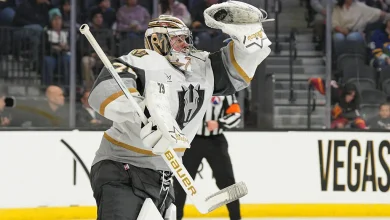Brad Majors at 50: Barry Bostwick talks a half-century of ‘Rocky Horror’

Brad Majors (Barry Bostwick) and Janet Weiss (Susan Sarandon) in an early scene from The Rocky Horror Picture Show
Even more than usual, The Rocky Horror Picture Show is everywhere these days. As the landmark cult film marks fifty years since its original release, retrospective documentaries and tributes have explored the creation of this singular phenomenon and the unique place it holds in global pop culture. There was no way Richard O’Brien could have known that the gender-bending tribute to vintage science fiction and Hollywood glamor he wrote would become a touchstone for multiple generations.
And Barry Bostwick, when he played the embodiment of white male cis-het-itude (at least at first), surely had no reason to expect that, five decades later, he’d be touring the nation with the film, communing with some of its most passionate devotees, and answering many of the same questions over and over from journalists. He seems to be handling all of those responsibilities like a pro, at least judging from the 45-minute telephone conversation we had.
Bostwick, 80, who was also in the original Broadway show of Grease and played the mayor on Spin City, was eager to discuss the lasting impact of Rocky Horror and his appreciation for those who appreciate it. He’ll be appearing at a screening at the Arlene Schnitzer Concert Hall at 7:30 p.m. Monday, October 27.
Questions and answers have been edited for brevity and clarity.
***
Oregon ArtsWatch: Rocky Horror is celebrating its 50th birthday at a time when its message of androgyny, tolerance, and “Don’t dream it—be it!” feels out of step with much of society. What does it have to say to audiences in 2025?
Barry Bostwick: I came up with this the other day when we were doing a show. In “Time Warp,” it’s a jump to the left and then it’s a step to the right. Well, let’s just make sure you don’t go to the far right! Because that would undo an awful lot of people and their enthusiasm and their needs, society-wise. So don’t take that far-right step.
Sponsor
OAW: And if it’s a jump to the left and merely a step to the right, then if you keep doing that you’re going to keep moving overall to the left. So if the dance is done properly, you keep moving in that direction, right?
BB: Oh, that’s good! I’m going to use that. Make sure you jump way to the left, and then tippy-toe to the right a bit, just to make sure you don’t go too far too fast. Which is also a message of the movie that a lot of people don’t get. They see it as campy fun, a throwback to sci-fi movies and this and that. But the Frank-N-Furter character is so narcissistic and overblown that some of the final lines in the movie, like “crawling on the planet’s face, some insects called the human race,” are a warning. Sure, don’t dream it, be it. But don’t hurt other people and don’t hurt yourself in doing that. Don’t follow these false gods.
Barry Bostwick, now 80, starred as Brad 50 years ago in The Rocky Horror Picture Show. He’ll be featured in an Oct. 27 screening of the cult movie at the Arlene Schnitzer Concert Hall.
OAW: People forget that the third act does get a little dark.
BB: Oh, it gets very dark. In fact, 20th Century Fox wouldn’t allow that song [“Super Heroes”] in the first cut of the movie. I think they wanted it to end on “it’s just a jump to the left,” you know, keep it light and airy. It was only after it hit the midnight circuit that Jim Sharman, the director, insisted it be put back in.
OAW: One of the reasons the movie has endured is that, despite the campy trappings, it’s a complicated story and says complicated things.
BB: Well, yes, and also the fact that the music is catchy as hell! Richard O’Brien, who wrote it, said he only knew three chords and he used them in every combination he could.
OAW: Which in some sense is the whole history of rock’n’roll, right?
Sponsor
BB: And if you look at his dialogue and his lyrics, they’re very witty and very wise. Sometimes when you go see this movie with all the hullaballoo, things being thrown and screamed, you sort of miss the fruit of it, the wonderful sassiness and elegance. The movie is one thing, but the evening is a totally different animal. We’re just background music to their shenanigans. There’s an old word.
OAW: I’m a big fan of “shenanigans.”
BB: I always encourage people to see it in their living room first and really listen to it and watch it, then go do all the other stuff, because otherwise you can miss the power of the film.
OAW: This is a film that gained its reputation by playing in scrappy, often dingy independent cinemas at midnight, and now, on this 50th anniversary tour, it’s playing places like the Arlene Schnitzer Concert Hall here in Portland that usually feature symphonies or literary events. What do you think of that environment as compared to the film’s grittier haunts?
BB: When you’re in a theater like that and you have 1,500 or 2,000 people out there yelling, and when you say “There’s a light on over at the Frankenstein place” everyone holds up glow sticks, it’s astonishing to stand on stage and see that. Used to be lighters, but we can’t do that any more. We can’t throw hot dogs anymore because apparently the theaters don’t want to have rats and cockroaches all over them.
OAW: Understandable, I suppose.
BB: But you’re right. Of course, before it was a movie it was in a 60-seat theater in London, and it was just supposed to be a little fun thing that these guys put together. It loses some of its grunge aspect when it goes to a big theater. It was first envisioned that the whole thing takes place in a movie house that was about to be torn down, so it had an avant-garde physical feel to it. After we did the movie, they were going to open the play on Broadway and they went too big with it and tried to make it into too much of a G-rated entertainment. And now there have been 30 or 40 LPs with different casts from around the world and VHS tapes and DVDs and Blu-Rays and 4k Blu-Rays. Disney owns it now and I thought they were going to bury it, but they just made a new 4k version of the film that we saw at the Academy Museum a couple of weeks ago. And it is a brilliant piece of film when you see it all cleaned up like that. People have made millions of dollars off of this, and they want to keep the cash flowing.
Sponsor
OAW: It sounds like a Rocky Horror Disney theme park ride might not be too far off.
BB: I doubt it. The rides would have to swing both ways.
Tim Curry as Dr. Frank-N-Furter and Barry Bostwick as Brad Major in a later scene from The Rocky Horror Picture Show
OAW: I assume you’re aware of Portland’s special relationship with The Rocky Horror Picture Show, particularly the Clinton Street Theater, which has been playing the film every Saturday night longer than anyplace else in the world. During the pandemic, it played to nearly empty houses, but it played.
BB: Yes, I’m well aware of that. I think we did something there once? And they’re probably going to be our shadow cast. What happens on this tour is that we pick up the local shadow cast, and some of these folks, because so many older, independent theaters have shut down since the pandemic, they are now doing their thing in these whitewashed new AMC theaters or whatever the hell they are. These sort of antiseptic environments. But for them to have the opportunity to do it on any stage is such a joy to them, and certainly to us. They’re the ones who have kept this thing going. It’s such an interesting group of people. One guy who played Brad in New Jersey was a physicist and he just loved playing Brad and he’d been doing it for ten years. We just got a job and did it in five weeks and moved on but a guy I was with the other night had been doing it for 24 years. You’ve got 18-year-olds who are as enthusiastic about it as the 60-year-olds.
OAW: It could be argued that some of the attitudes, representations, and language in the movie would be seen as dated or even offensive in another context, but things like the usage of “transvestite” and “transsexual” haven’t caused any pushback that I’m aware of.
BB: They don’t say “transsexual” any more? What do they say?
OAW: I think “transgender” would be the more common term today. But that doesn’t roll quite so salaciously off Tim Curry’s tongue. But the whole scene has become such a safe space for people who might not be able to be their true selves, or their current selves, elsewhere.
Sponsor
BB: Susan [Sarandon] and I sing “There’s a light on over at the Frankenstein place,” and I’ve said that I think that light illuminates a space where it’s safe to explore. Maybe it’s just for the night, or perhaps you just want to watch something that’s different, that you don’t see every day in your neighborhood. A gentleman the other night during the VIP portion of the event basically fell to his knees weeping because the movie had meant so much to him at a time when he was in need of a family of some sort.
OAW: Have you seen the documentary Strange Journey that was released earlier this year?
BB: I have not seen it yet. I was interviewed for it. These documentaries are fascinating. We’re about to release a documentary called Making Megaforce, which was a movie I made in the 1980s. It’s about this guy from Seattle, Bob Lindenmayer, who discovered his love for this film at 12 years old. I was the good guy and he needed a good guy in his life. Eventually he met me and we went on the journey to make this film. It’s almost like a bromance. It’s out at festivals now and winning awards.
OAW: It sounds like it speaks to the fact that, in the right circumstances, almost any film has the ability to change someone’s life. I’ll keep an eye out for it. One point that comes up in Strange Journey is that you and Susan were some of the only cast members who weren’t in the stage production, which enhanced the sense of your characters as outsiders who stumble onto this insular group of weirdos. What was your experience of that?
BB: You’re right, I think that’s why Fox cast me and Susan, because we were sort of the iconic American couple. And they threw us into the world quickly. We got off the plane, went into rehearsals, and didn’t really get to know anybody. They saw us as the outsiders, which worked so well when we started filming. Susan, who’s such a fabulous actress, was playing every ingenue she had played before, but with a twist. And I was doing the same thing, playing the ’50s male that I had been sending up in other roles, whether it was Grease or something else. It was only after thirty years that I got to know Pat [Quinn] or Nell [Campbell] or even Tim. Tim was the most open to us of any of them. But everybody else, either it was their first film or they just didn’t like us.
OAW: Or they were just coming to the experience with a completely different perspective than the two of you.
BB: That’s true. Nell was a street busker, you know, when they cast her. Patricia, on the other hand, was a sort-of well-known actress, doing Shakespeare and this and that. But we didn’t really get to know them, and it worked out great. You explained it in the question. We were always the outsiders, up until the last day of shooting. We didn’t socialize with them, mostly because everybody was working so hard, and when it was over we were flown out the way the castle is flown back to Transsexual Transylvania.
Sponsor
OAW: I’m glad you mentioned Grease, because not many folks, even Rocky Horror fans, might know that you initiated another iconic role in 1970s musical theater as Danny Zuko, the role that would make John Travolta a movie star, in the original Broadway production. Are there any roles later in your career that you feel like you got because of Rocky Horror’s growing fame? Or any that you didn’t get for the same reason?
BB: I can tell you one role that I got despite it, one that I was surprised to get, and that was George Washington. If they had seen me in my bustier and high heels from Rocky Horror just a few years earlier, I don’t think I would have been cast. But I don’t know if anyone can say that because they were in Rocky Horror, they got such and such. And it was such a slow burn. So I can’t say that I’ve ever gotten anything because of it, other than a life of memories of interesting people that I would probably never have met if I hadn’t done The Rocky Horror Picture Show.
***
The Rocky Horror Picture Show with Barry Bostwick 50th Anniversary Spectacular Tour stops at Portland’s Arlene Schnitzer Concert Hall on Monday, October 27 at 7:30 p.m.; doors open at 6:30 p.m. See ticket and other information here.




